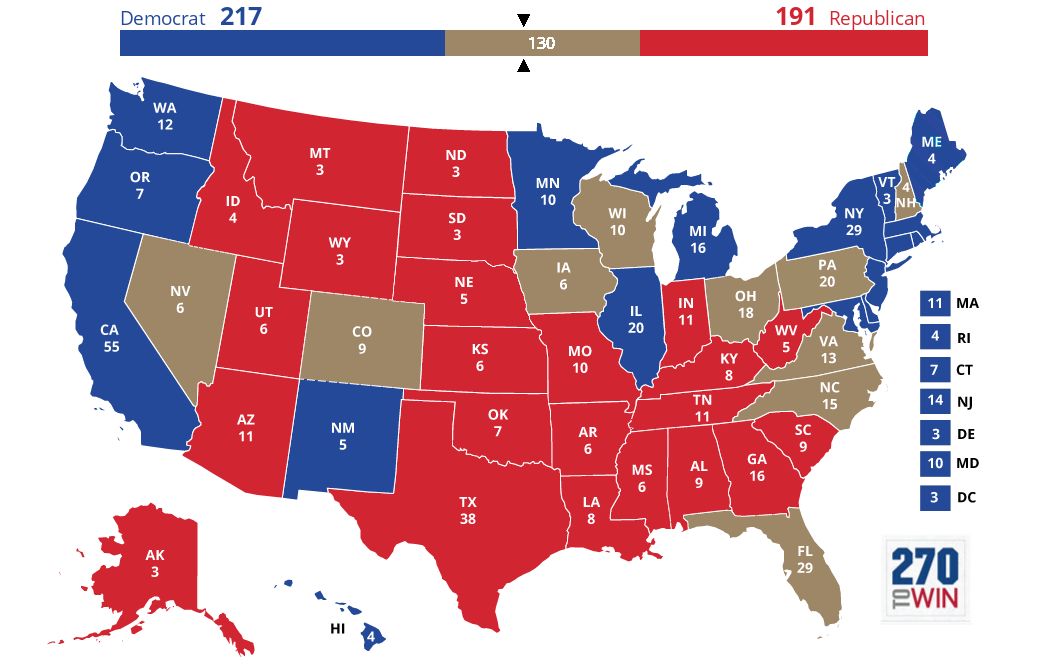Electoral Map Could Turn Into Nightmare for Clinton and Trump

As is the nature of a federal republic, all too often major presidential elections come down to just a handful of states. This year, it's beginning to look like ten states will make or break the presidential bids for the White House:
 The Democrats have a slight lead in the secure electoral votes. Being able to consistently claim California is definitely a major boost.
The Democrats have a slight lead in the secure electoral votes. Being able to consistently claim California is definitely a major boost.
But this year's battleground map has some interesting quirks; namely, that both Trump and Clinton did very well in most of these states. Both candidates have lost 3 of the battleground states in the primaries, Trump lost Iowa, Ohio, and Wisconsin (Colorado GOP did not hold a presidential preference poll for voters), while Clinton lost New Hampshire, Colorado, and Wisconsin.
Wisconsin is going to be a major battleground; both candidates need to restore their credibility.
But there's also an old adage in politics: you have to win your home state to win the election. But in 2016, both Trump and Clinton share New York as their home state -- Trump, a lifetime New Yorker, and Clinton a southern expatriate to New York via the open U.S. Senate seat in 2000.
New York's 29 electoral votes might not be as safely blue as they once were, although voter turnout in the primary still indicates that voter preferences are still more Democratic, with a little over twice as many Democratic ballots cast. But anything can happen in politics, and you can never discount a home field advantage in a race.
Choice of running mates will make or break the ability to win the battleground states.
Trump has to do something to counter Clinton's political 'insider' edge. He needs a running mate who is tough, has good political connections, is well-liked within the party, and has experience winning tight elections.
Trump's running mate will probably not play the traditional role of 'attack-dog,' going after the opponent's policies while keeping the presidential candidate above the fray. Trump will more than likely reserve that role for himself.
Clinton's running mate needs to do one of two things, solidify the far left's and progressive's support, or rally the political center to her cause. This sounds almost ludicrous, but Clinton having been forced to the left by Sanders' popular movement has hurt her relations with the Democratic moderates. She needs a running mate that can still hold on to one of the critical base elements, while she works with the other.
Both candidates need someone who boosts their public image; neither one can afford a running mate that turns into a PR nightmare.
Clinton might substantially benefit from having Sanders as her VP pick, if Sanders would agree to the role, and it would definitely shore up a lot of the hard feelings within the Democratic Party.
Trump will almost certainly not pick a former candidate; it goes too far against his own personality. Why pick a 'loser' that you've already defeated?
Trump's pick will almost certainly need to have the ability to fight Clinton's popularity with minority voters, an area he is too weak on to ignore.
But the bottom line in these battleground states is that trade might be the only issue needed to win. With three big prizes in the Rust Belt, the candidate with the best plan and presentation on trade is likely to sweep those states. Clinton needs some work on this, her entanglement in the TPP is going to haunt her and will almost certainly be a constant point brought up in these critical states.
So, we now enter the phase of the presidential race of holding what you have, making inroads into possible new states (Louisiana might be ripe for a flip), and figuring out which running mate will help you win those final 10 battleground states that will win or lose the whole contest.
All this, while trying to give at least some down-ballot support to your party's races in the Senate and House.
So for Clinton and Trump, the real work is just beginning -- a far harder task than they've ever faced in the primary and one where neither side has an edge of 'being there' before.



